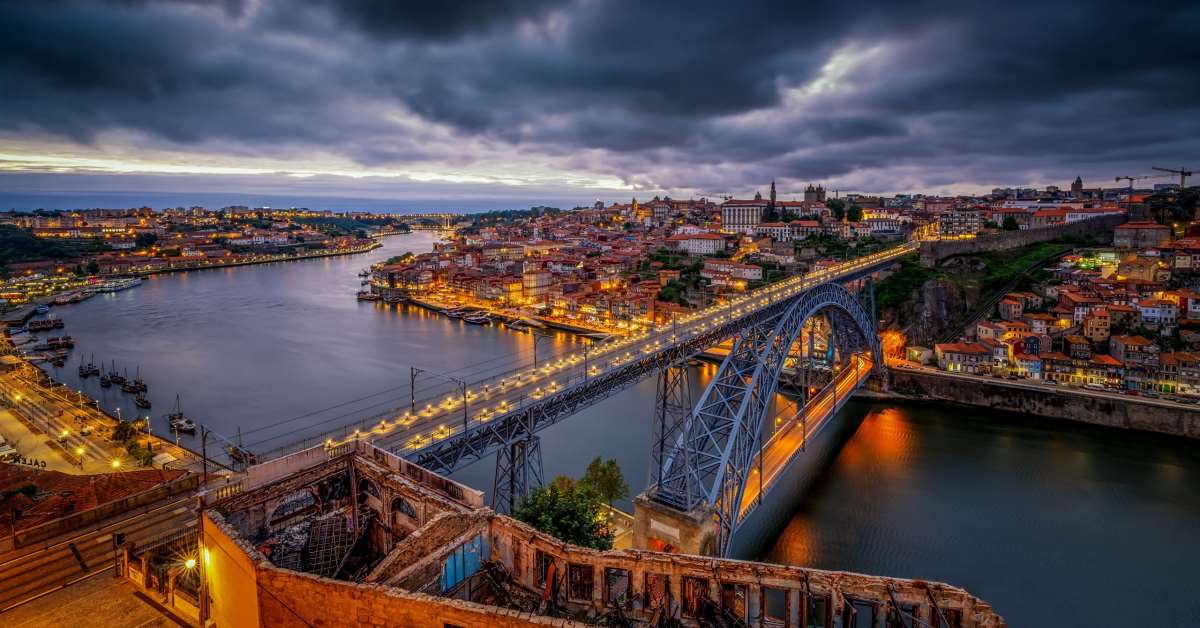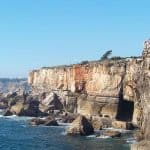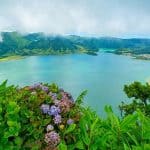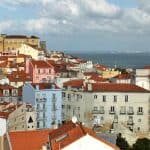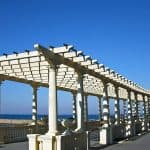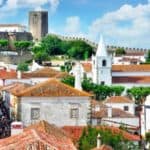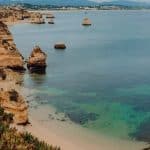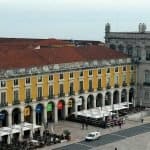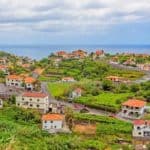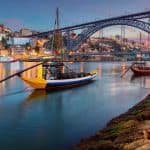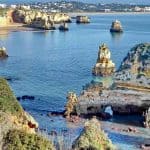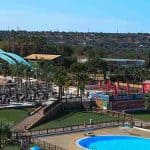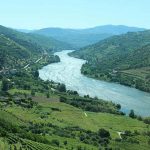Between Spain and the waters of the Atlantic Ocean lies the vibrant and spectacular country of Portugal, which for hundreds of years was considered the edge of the world. Although researchers (many of them of Portuguese descent) eventually determined otherwise, Europe's westernmost nation still feels like it resides on the edge of nowhere. With a perfect mix of European sensibility and untamed natural beauty, the country has become the ultimate adventure destination for hikers, surfers, divers and more.
Portugal offers tourists everything from ancient castles from the Middle Ages, through volcanic islands to bustling big cities or sleepy and isolated fishing villages. Portugal combines European comfort with exotic uniqueness and a vibrant Latin vibe. No wonder more and more tourists visit it every year.
If you are considering a trip to Portugal, the following guide will give you some order and it is inclusive All the recommendations and tips for how, when, and why to travel to Portugal.
Why visit Portugal?
Portugal is a relatively small country, and despite its small area, its diversity is enormous. With miles of coastline, Portugal offers beaches that suit every taste: blue and peaceful lagoons in the southwest of the country, or stormy beaches in the north, which are especially loved by the surfer community. Portugal is also home to wonderful cities Lisbon and detailed - Two of the oldest and most interesting cities in Europe that combine in perfect synergy traditional architecture alongside kicking artistic bohemia and stylish cafes.
Because of its geographical location, Portugal was a popular crossing point between Europe, Africa and America. In other words, the Portuguese are people who are used to visitors and are generally very friendly towards international tourists, and although the official language in Portugal is Portuguese, the majority of its inhabitants speak English, which allows many tourists to travel easily.
But the thing where Portugal stands out above other Western European countries is undoubtedly the "wallet department". Despite the fact that Portugal operates in the Euro, it is still considered a cheap (relatively) and affordable destination in Western Europe. Expenses for lodging, meals and transportation will usually be much lower than neighboring countries. For example, a three-course dinner will cost approximately 13 euros, and a single ride on the city metro will cost less than XNUMX euro.
Attractions in Portugal
Off-road tracks and treks
Portugal is home to some of the most beautiful routes in Western Europe: breathtaking landscapes, dramatic cliffs and wonderful beaches are just a small part of what the country has to offer. Below are the most recommended routes for nature lovers in Portugal:
Portuguese Way – A route that starts in the capital city of Lisbon and continues into the Spanish city of Santiago de Compostela. The trek extends over 600 km and passes through rivers, valleys, countryside and a beautiful stretch of coast.
Rota Vicentina - A network of spectacular trails that are considered one of the must-see attractions in Portugal. Navigating the various routes will expose the travelers to the pristine beauty of Algarve region in the southwest of the country. Derech Vicentina is a nature reserve that stretches along the spectacular stretch of coast full of jagged cliffs, sweeping views of the ocean and a wide variety of flora and fauna unique to the region. All paths lead to Cabo de São Vicente - the southwestern tip of Europe, once considered the modern "end of the world".
Madeira - These group of islands are famous for their wonderful beaches, but the volcanic peak Pico Ruivo, which rises to a height of 1,500 m above sea level, is a pilgrimage center for many travelers visiting the archipelago of Madeira.
surfing
With many sunny days and waves suitable for every level, Portugal is the ultimate surfing destination in Europe. Even if you are not on the coastline, a short drive of a few hours will bring you to golden beaches and great waves for waves.
Both beginners and advanced surfers will be able to catch waves on one of Portugal's beaches, and for challenge lovers there are beaches famous for their huge waves. The beaches in Portugal are clean, tidy and varied. It doesn't matter if you choose to surf the humid beaches of the north, the arid beaches of the south, or the unique beaches of the Azores or Madeira, what is certain is that you will enjoy riding the waves and enjoying the unique Portuguese beach atmosphere. Some of the famous destinations in Portugal for surfing:
Carcavelos - A short metro ride from downtown Lisbon will take you to a stunning sandy beach, with waves suitable for beginner or intermediate surfers. The beach is full of restaurants and surf shops, which makes it possible to easily rent a surfboard, take a surfing lesson and eat a light meal after surfing.
Arrifana beach - Located in the town of Aljur in the Algarve region, about three hours' drive south of Lisbon. The beach is actually a crescent-shaped sandy bay, set between tropical blue water and sandstone cliffs, and the scenery looks like it was taken from a postcard. The half-moon shape of the beach allows the formation of high waves while blocking the wind. For beginners there are several surf schools in town that offer surfing lessons and surfboard rentals.
Praia do Cabedelo – The beach strip is located on the south side of Figara de Foz, a coastal city less than an hour and a half drive from Porto. The surf beach is popular with intermediate surfers and above, offering high and long waves with expansive sand dunes. Recently the beach became the first night surfing destination in Europe, lit up at night by 21 floating lighthouses that project light onto the water.
Diving and kitesurfing
Despite the cold waters, Portugal is a diverse diving destination suitable for all levels. The country has 71 protected marinas (areas designated to protect species and ecosystems while promoting sustainable ecotourism), which provide unparalleled diving adventures right off the mainland's coast. Because of its jagged coastline and sweeping storms, Portugal has hundreds of shipwrecks to explore, and deep-sea creatures abound. Madeira, the western chain of islands, offers warmer and clearer water, but requires a short flight. Portugal's diving infrastructure is strong, with diving tour operators and certification experts available along the coastlines.
In addition, Portugal's lush coastline is often accompanied by strong winds. And while that might put off the average tourist, kitesurfers see it as a blessing. Portugal has emerged as a hot destination for the extreme sport of windsurfing. Beach Guincho Beach is an ideal surfing site that offers windsurf rentals and lessons for beginners or advanced.
Recommended destinations in Portugal
Lisbon
The beating heart of Portugal, the country's capital is a spectacular mix of history, art, music and cuisine that hits every taste. Lisbon is known in the local jargon as the "city of seven hills" because it is built on steep slopes connected by narrow staircases and cable cars that lead to wonderful views of the city and the Tagus River below.
Recommendations in Lisbon
Castelo de sao jorge - As mentioned, Lisbon is the city of hills and has many spectacular viewpoints. One of the famous points in the city is the castle wall of Castelo de São Jorge - a castle built in the tenth century on top of old ruins. To get to the castle you can take line 28, and for the brave you can climb up the stairs fromPraça dom Pedro IV.
Alfama - Below the Castle of Castelo de Sao Jorge is the cool Alfama neighborhood. This neighborhood is among the units that survived the devastating earthquake and tsunami in 1755. Today, the neighborhood is a maze of streets, alleys and staircases filled with restaurants, shops and vibrant nightlife.
Carmo Archaeological Museum – one of the oldest churches of Lisbon. In the past Ijerja do Carmo was almost destroyed by the earthquake in 1755, and today a small architectural museum stands there in the ancient skeleton of the church and overlooks the beautiful square of Largo do Carmo.
Mosteiro dos Jerónimo - a monastery dedicated to the findings of Portuguese explorers and the Age of Discovery. This 16th century monastery is one of Portugal's most culturally important landmarks and a UNESCO World Heritage Site.
Fado music – Music Portugal's tortured love has become famous around the world, but Lisbon is one of its main centers. Clube de Fado hosted some of the most famous fado artists in history and still hosts weekly shows for locals and tourists alike.
Sintra - About 40 minutes of traveling by train outside of Lisbon will bring you to this wonderful town located among wooded hills. Sinatra Received a UNESCO World Heritage designation in 1995 for its "cultural landscape", the first of its kind in Europe. Its most popular attraction is the Pena Palace, a collection of brightly colored buildings overlooking the Atlantic Ocean, including a Moorish castle, which serves as the summer home of the Portuguese royal family .
detailed
Porto lies along the beautiful Douro River, and has a more historic feel than its metropolitan sibling to the south. A maze of red-tiled roofs, narrow streets and strange facades, Portugal's second largest city is both mysterious and romantic. The city is the home of port wine and offers a rich menu of fresh seafood, and not just Porto is known as the culinary capital of Portugal.
Recommendations in Porto
Cais da Ribeira - Porto's bustling riverfront is cut straight out of an impressionist painting, where tourists and locals enjoy a variety of restaurants, local crafts and wine tasting on the riverside promenade.
Livraria Lello - is considered one of the most beautiful and oldest bookstores in the world, a store that is also a library. This area is a testament to Porto's rich literary culture, and some say the store inspired the famous bookshop in Harry Potter.
Jardins do Palácio de Cristal - These gardens, modeled after the Crystal Palace monument in London, offer shaded paths with a variety of trees, sculptured shrubs and a view of the romantic Douro River.
Tour to the port wine cellars – Porto's collection of port wine cellars offers a history (and a taste) of Portugal's most famous export, the wine cellars are located in magical caves along the south bank of the Douro River in the Vila Nova de Gaia area.
Azores Islands
Azores Islands It is a remote island chain that tickles the edge of fantasy and reality and you could write a whole guide about it. These impossibly green volcanic islands feature rugged and dramatic landscapes of mountains, cliffs, waterfalls and lakes, earning it the title of one of the largest uninhabited nature reserves left on Earth.
Although the weather on the islands usually includes large tropical storms or overcast skies, when the weather breaks - the Azores are an experience unlike any other. On a trip to the Azores you can reach the summits of active volcanoes, explore isolated islands and absorb the wild and romantic nature of the islands.
Lagos
Lagos, a magical oasis in the southwest corner of Algarve region. Lagos is an attractive area for international adventurers. In addition to the rugged beaches and the sparkling waters of the sea, Lagos offers diving, cliff jumping and extreme rock climbing. In recent years Lagos has become a destination for adventure travel and today a wide selection of restaurants and accommodation options have been added to it
When is the best time to visit Portugal?
In general, Portugal is at its peak in late spring and early fall. While the cool sea breeze keeps the country pleasant in hot summers, Portugal receives an influx of European tourist traffic from the end of June to the end of August (most Europeans dedicate the month of August to vacations). At the opposite end of the spectrum, late November to March is distinctly rainy season in Portugal, not exactly ideal for a beach vacation. The best times to visit are from the end of April to the middle of June, and from the beginning of September to the beginning of November. Late spring is also festival season in Portugal, which may increase some expenses, but will definitely increase the cultural experience.
Where should you sleep?
Accommodation in Portugal ranges from five-star hotels to backpacker hostels, with a wide range of options in major metropolitan areas and small towns alike.
Portugal is also home to the Posadas - a collection of hotels and hostels that were once controlled by the government and offer accommodation in historic buildings such as medieval palaces and castles across the country that are now privately managed.
In recent years, a lot of backpackers from all over the world have been flocking to Portugal, so it's quite easy to find a bed in a hostel for less than $15 a night. For the adventurer, explore Portugal in a van, parking the caravan is free in designated parking lots.
Useful information
Arrival and movement
There are several means of transportation in Portugal, and its public transportation system is convenient and user-friendly. Portugal's trains are well networked and with them you can reach almost any point in the country at a cheap cost. If you belong to the bus school, Portugal operates hundreds of bus lines that reach all corners of the country. The big cities like Lisbon have a convenient metro network and also a tram network that travels around the city.
For those who plan to get around using public transportation, it is highly recommended to purchase a daily, three-day or weekly travel ticket. Car rental is also a good option for people who like to be behind the wheel, and the price varies depending on the type of car and the conditions of the car rental agency.
Of money
Like most European countries, Portugal also uses the Euro. However, the country still respects its old currency, the escudo, and will do so until 2022. It's better to withdraw money at an ATM in town than exchange money at the airport (these exchange agencies are notorious for offering the worst exchange rates). The daily budget very much depends on the nature of your trip, but Portugal in general is considered a cheaper destination than its neighbors.
What to pack?
It's worth remembering that although Portugal generally enjoys beautiful weather throughout most of the year, conditions can get chilly and there's a lot of wind along the coast. You should always prepare for any weather and use the onion method. It is recommended to bring a windbreaker, comfortable walking shoes, hat, scarf, etc.
Also, many cathedrals and churches adhere to a dress code and require covering the shoulders before entering, and it is better to take this into account.



